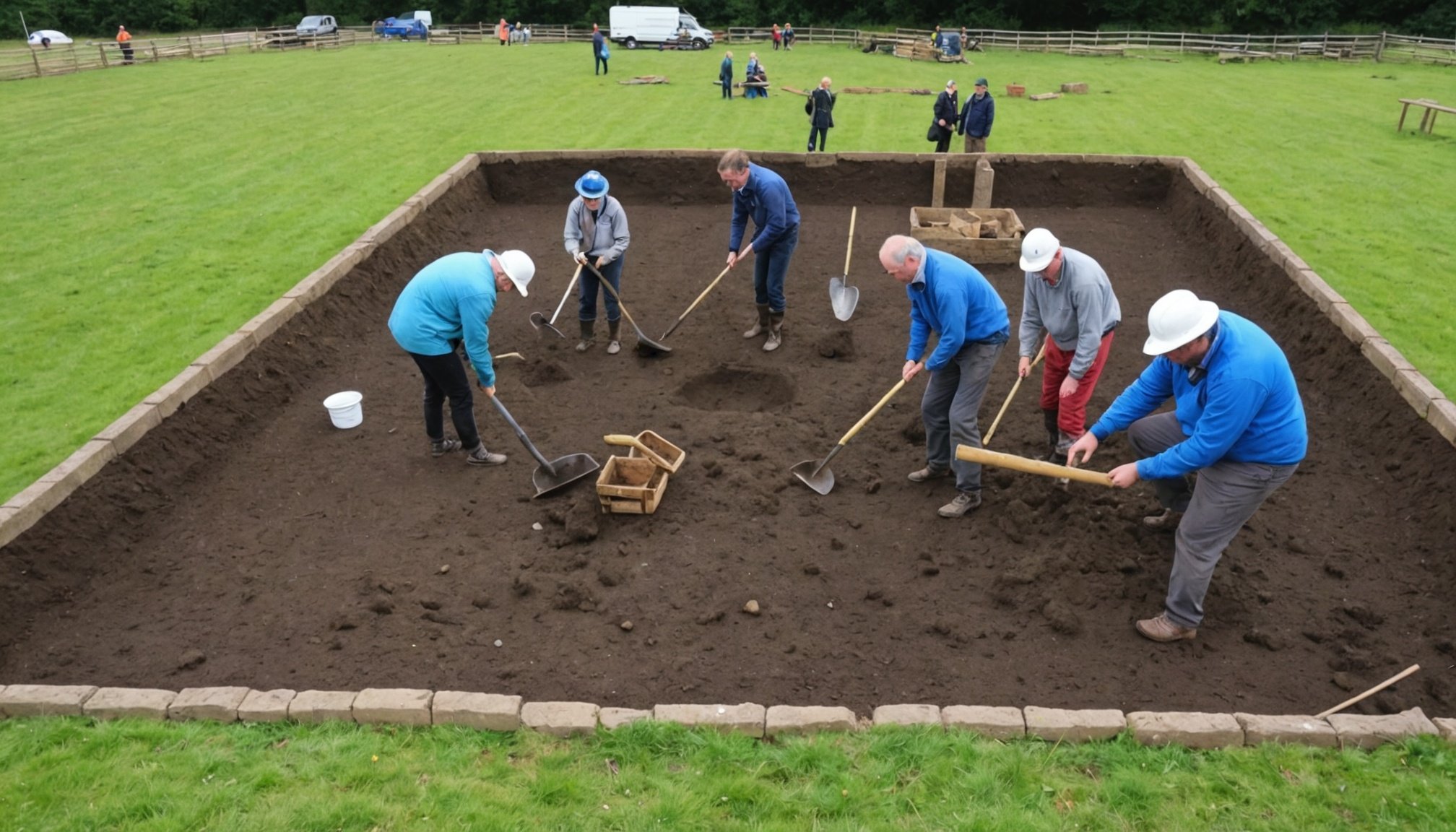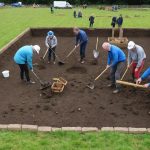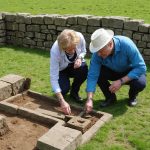Overview of Archaeological Digs in the UK
Archaeological digs play a vital role in preserving the rich history of the United Kingdom. Acting as windows to the past, these digs uncover artefacts and remnants that shed light on ancient civilizations. The UK’s landscape is dotted with numerous significant sites that offer fascinating insights into its historical progressions.
Popular Archaeological Sites
The UK houses an array of well-known archaeological digs. Sites like Stonehenge provide glimpses into prehistoric England, while Hadrian’s Wall reveals Roman Britain’s defence mechanisms. These landmarks are not just tourist attractions; they are crucial for understanding the cultural and historical tapestry of the region.
Topic to read : Discover Authentic UK Folk Music: Top Venues and Events to Experience Tradition
Participation Opportunities
Participating in archaeological digs is an enriching way to connect with history. Various opportunities exist across the UK for enthusiasts to get involved. From volunteer programmes at historical sites to field schools that teach excavation techniques, individuals can actively contribute to historical preservation. Detailed guidance and expert supervision ensure participants gain a comprehensive understanding of archaeological methods without prior experience. Not only do these experiences enhance personal knowledge, but they also help propagate public awareness and appreciation of the UK’s archaeological heritage. Whether through short-term visits or extended commitments, opportunities abound for engagement and exploration.
Upcoming Archaeological Digs and Events
Exploring archaeology through upcoming digs and events offers a unique opportunity to connect with history. The schedules for these outings frequently change, so staying informed is pivotal.
In parallel : Discover Authentic UK Knitting Circles: Where to Connect with Traditional Knitters
Summer 2024 Archaeological Digs
Summer 2024 is packed with exhilarating archaeological digs across various sites. These are meticulously scheduled to coincide with academic breaks, offering enthusiasts and students a chance to participate. The season kicks off with a pivotal dig in the UK, Delaware Valley Fields Foundation, focusing on imperial Roman artefacts. Incorporating modern technology, these digs promise a hands-on experience coupled with educational insights, perfect for both professional archaeologists and amateur enthusiasts.
Autumn 2024 Archaeological Opportunities
As the leaves fall, the autumn 2024 digs present formats that adapt to cooler climates, ensuring optimal conditions for excavation. One of the highlights includes a series of digs in Greece, unearthing secrets of ancient civilisations. These events often incorporate workshops and lectures, fostering a deeper understanding of archaeological methods.
Special Events and Festivals
In addition to digs, several special events and festivals invite public participation in various locations. These events combine academic discourse with hands-on activities, such as Indiana’s Archaeology Celebrations and Mediterranean Heritage Festivals.
To stay updated, interested individuals should subscribe to newsletters and follow social media channels of archaeological institutions for the latest releases on new and rescheduled events.
Application Procedures for Participation
Embarking on an archaeological volunteering adventure is an exhilarating experience, but it all begins with navigating the application process effectively. Here’s a simple guide to help you through.
Firstly, acquiring a comprehensive understanding of the participating organizations is crucial. Each may have specific registration forms and volunteering requirements. Typically, you’ll need to submit an application form that includes your personal information, availability, and prior experience in archaeology, if any.
Secondly, you must prepare necessary documents. Standard requirements usually include a copy of your passport, a resume detailing related experiences or skills, and sometimes a motivation letter. Some organizations might even ask for letters of recommendation.
Mind the application deadlines; they can vary significantly. Depending on the popularity of the dig site or the type of excavation, deadlines range from several months to a few weeks before the start of the event. Missing these deadlines could mean missing the opportunity entirely.
Finally, after successfully completing your application and submitting it, patiently await confirmation and additional instructions from the organizing body. Staying proactive and following up, if needed, can demonstrate your eagerness and commitment to the project.
Eligibility Requirements for Participants
Before entering a programme, understanding eligibility criteria is crucial. Not only does it provide clarity, but it also enhances the likelihood of successful participation.
Age and Background Requirements
Participants generally need to meet specific age requirements. While some programmes cater to younger demographics, others may require individuals to be above a certain age, often 18 or 21. Checking these details early is essential.
Skills and Experience Expectations
When it comes to experience, programmes may demand a certain level of knowledge or skills. Educational background, work experience, or even volunteer history could play a role. Defining such expectations helps in matching the right candidates with the right opportunities.
Special Considerations for International Participants
For those applying from abroad, special eligibility pathways might exist. Programmes often have specific guidelines, including visa stipulations and language proficiency requirements. Understanding these nuances ensures that international applicants can navigate the process smoothly.
To ensure a seamless selection process, always scrutinize the eligibility criteria and other related requirements. This proactive approach assists potential candidates in positioning themselves favourably, aligning both age, expertise and their qualification attributes effectively.
What to Expect from an Archaeological Dig Experience
Embarking on an archaeological dig as a participant can be both thrilling and enlightening. Typically, each day begins with a brief training session to ensure team members are equipped with essential skills for the dig. This is often followed by morning site exploration, where participants engage directly with excavation activities, offering hands-on experience with artifacts and site details.
Throughout the experience, participants are matched with professional mentors who guide them in understanding the nuances of excavation techniques. These mentorship opportunities are pivotal, providing insights into the strategies and tools employed in gathering data. The guidance also allows participants to grasp the careful balance between uncovering history and preserving its integrity.
When it comes to archaeological sites, each holds unique historical significance. Participants are often exposed to a variety of these sites, gaining a deeper appreciation for the importance of context in archaeology. These explorations offer a glimpse into the past, unveiling the stories etched into these remnants of history.
Through hands-on activities, combined with expert training and site-specific insights, participants leave with a profound understanding of both the technical and historical aspects of archaeology. They also gain invaluable experience that can set the foundation for future endeavors in the field.
Benefits of Participating in Archaeological Digs
Participating in archaeological digs offers numerous benefits that can enrich both education and personal growth. Engaging in these activities provides invaluable hands-on experience that goes beyond traditional classroom learning.
Skill Development
Participating in a dig helps to develop a range of skills. Key skills include:
- Teamwork: Working collaboratively with others towards a common goal.
- Critical thinking: Analyzing artefacts and making informed decisions based on evidence.
These experiences allow individuals to grow professionally and personally, providing a practical application of theoretical knowledge.
Networking Opportunities
Archaeological digs offer unique networking opportunities. Participants have the chance to connect with professionals and other like-minded individuals passionate about the field. These networks can be instrumental in advancing one’s academic or professional career, offering pathways to new collaborations and insights.
Contribution to Archaeology
Participants actively contribute to ongoing archaeological research. Their efforts help uncover historical artefacts, shedding light on past civilizations. This contribution not only assists researchers but also enriches our understanding of history and culture. Being part of such meaningful work can be incredibly rewarding and fuels the passion for those interested in archaeology.
Engaging in archaeological digs is a multifaceted experience with significant benefits, providing education, experience, and a chance to make a real difference in the field.
Testimonials and Success Stories
Engaging in archaeological digs often leads to transformative experiences for participants. Anna, a recent participant, shared her testimonial about unearthing artefacts that have shaped her understanding of history. “The dig helped me see how past civilisations lived,” she noted, illustrating the hands-on learning impact. Her participant story showcases not only the exciting discoveries but also the success in gaining practical skills such as precise excavation techniques and teamwork.
Moreover, there are numerous success stories highlighting the long-term benefits of these experiences. John, another participant from previous digs, remarked on how the skills acquired during the program translated to career growth. He is now employed as a researcher, attributing his career breakthrough to the critical thinking and analytical skills honed during the dig.
Participants have reported significant improvements in both skills and personal growth. Many found that engaging in archaeological fieldwork allowed them to develop resilience, adaptability, and a deeper appreciation for cultural heritage. These comprehensive testimonials emphasize the dual impact of participating in digs: profound personal growth and professional advancement. These stories underscore the meaningful and lasting influence of archaeological pursuits.
Resources for Interested Participants
Embarking on a journey into the world of archaeology can be immensely rewarding. Whether you are an aspiring archaeologist or a curious enthusiast, having access to the right resources is pivotal. These resources can provide additional information and opportunities for further learning, ensuring you stay informed and engaged in the field.
Links to Archaeological Organizations
To start, exploring reputable organizations is a great step. Key organizations in the UK, such as the Council for British Archaeology and the Society of Antiquaries of London, offer a wealth of opportunities, including archaeological digs and educational programs. These groups often provide access to journals, networking events, and workshops, which are indispensable for growing your expertise.
Recommended Reading and Study Materials
For those keen on deepening their understanding, reading is invaluable. Titles such as “The Archaeology Book” by David Down or “Understanding Archaeology: A Guide to the World’s Ancient Civilizations” by Michael Patrick O’Neill are highly recommended. Articles from the Journal of Archaeological Science can also provide insights into recent discoveries and methodologies in the field.
Online Communities and Forums
Engaging with online communities like Reddit’s r/Archaeology or participating in forums such as the British Archaeology Forum can connect you with fellow enthusiasts. These platforms offer support, updates, and a space for sharing discoveries, facilitating a robust learning environment for interested participants.
Integrating Robot Hoovers into Modern Homes
Incorporating a robot hoover into your home can be a transformative experience. How do robot hoovers fit into contemporary lifestyles? With sleek designs and intelligent systems, these devices seamlessly blend into modern living spaces, offering both functionality and elegance. They are not just a gadget but a practical solution for maintaining cleanliness while you focus on more important tasks.
Suspending the major upkeep typically required by traditional vacuum cleaners, robot hoovers are designed for convenience and ease of use. Their simple operation and smart navigation eliminate the need for constant supervision, making them ideal for busy households. As they autonomously sweep across your floors, they enhance your daily routine without intrusion.
But what about efficiency? Technologically advanced sensors and brushes ensure thorough cleaning, picking up debris from corners and under furniture that might otherwise be missed. They adapt to different floor types, transitioning from hardwood to carpet with ease.
Their ability to schedule cleanings keeps your space tidy even when you’re not around. This hands-free approach, paired with their ability to navigate complex room layouts, ensures every corner is addressed, making them indispensable in maintaining an orderly environment without effort.











